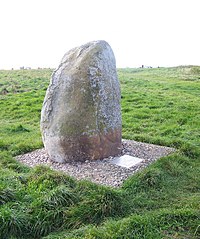Battle of Ethandun
| Battle of Edington | |||||||
|---|---|---|---|---|---|---|---|
| Part of the Viking invasions of England | |||||||
 Memorial to the Battle of Ethandun erected in 2000 near Bratton Castle. |
|||||||
|
|||||||
| Belligerents | |||||||
| West Saxons | Danelaw Vikings | ||||||
| Commanders and leaders | |||||||
| Alfred the Great | Guthrum the Old | ||||||
| Strength | |||||||
| unknown | unknown | ||||||
| Casualties and losses | |||||||
| unknown | unknown | ||||||
Coordinates: 51°15′50″N 02°08′34″W / 51.26389°N 2.14278°W
At the Battle of Edington an army of the Anglo-Saxon kingdom of Wessex under Alfred the Great defeated the Great Heathen Army led by Guthrum on a date between 6 and 12 May AD 878, soon resulting in the Treaty of Wedmore later the same year.The primary sources locate the battle at "Ethandun" or "Ethandune", and until a scholarly consensus identified its location with the present-day Edington in Wiltshire it was known as the Battle of Ethandun, a name which continues to be used.
The first Viking raid on Anglo-Saxon England is thought to have been between AD 786 and 802 at Portland in the Kingdom of Wessex, when three Norse ships arrived and killed King Beorhtric's reeve. At the other end of the country, in the Kingdom of Northumbria, during AD 793 the Holy Island of Lindisfarne was raided. After the sacking of Lindisfarne the raids around the coasts were somewhat sporadic till the 830s, when the attacks became more sustained. In 835, "heathen men" ravaged Sheppey. In 836, Ecgberht of Wessex met in battle a force of thirty-five ships at Carhampton, and in 838 he faced a combined force of Vikings and Cornishmen at Hingston Down in Cornwall.
...
Wikipedia
